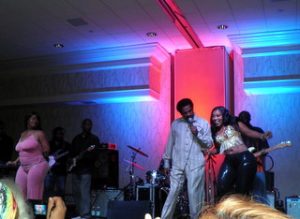Portland Waterfront Blues Festival 2012
Curtis Salgado, Booker T, James Cotton, Bobby Rush, Bettye Lavette, and Tom Lang (and some fun music clips)
Curtis Salgado is having part of one of his lungs removed this week and, understandably so, Curtis cancelled his concert last night at Dawson Park, a small park in north east Portland, Oregon, across the street from my elementary school, Immaculate Heart.
Curtis almost died of liver failure 6 or 7 years ago. Without health care (of course), help came from the music world in the form of a fundraiser headlined by Steve Miller and Bonnie Raitt and terrific blues bands from up and down the coast. Curtis received his liver transplant and lived to sing again.
Curtis and Steve Miller on Conan in the 90s
I first heard Curtis when he fronted the Nighthawks, a boogie blues band in Eugene, Oregon where I was studying journalism. That was two years before John Belushi, filming “Animal House” near the University of Oregon campus, walked into a bar and heard Curtis. The Blues Brothers album is dedicated to Curtis Salgado.
Curtis went on to sing for another Eugene based band, the Robert Cray Band. The popular, Ronnie Earl guitar driven road band Roomful of Blues took him on as lead singer. He followed that with a brief stint with Santana. In the 90s, in recovery, he settled into a productive period back in Portland with the Stilettos, and I would go hear him whenever I was in town. He even popped up in my little Alaska town, Haines, for the Southeast Alaska State Fair.
So it was great to be at the 25th Portland Waterfront Blues Festival and to see him headlining the first day. The Portland Blues Festival is the second largest blues festival in the world next to Chicago. All proceeds go to a food bank in Portland. Admission is $10 and 2 cans of food. This year the festival raised almost one million dollars and over 100,000 pounds of food for the hungry.
On the four stages there were zydeco bands and dance lessons, blues harmonic blow-offs, a tribute to Etta James. There were the relatively new school bands like James Hunter, Galactic, Lionel Young, the California Honeydrops.
And then there was old school. Curtis, James Cotton, Bettye Lavette, Bobby Rush, Booker T. And over the five days of the festival they made me reflect on the blues.
Before I became obsessed with basketball I spent many mornings and afternoons in Dawson Park, across from my grade school, playing on the teeter totter, swinging on the swings. There was an old black man who always sat on the same bench every day, a brown paper bag in one hand, slugging back, probably, the cheap, fortified wine of the day. My mother always told me to be respectful to everyone and my daily exchange with the man went like this:
“Good morning, sir.”
“Good morning, little white boy.”
“How are you, today, sir?”
(Pause) “I’m a little bit of all right, little white boy. I’m a little bit of all
right.”
He said that to me every day. It was like a great blues song, the singer repeating the first two lines (I’m a little bit of all right/I’m a little bit of all right”). But I hadn’t heard much blues music yet. What I was hearing on my walks to school was jazz I learned later was Miles and Cannonball Adderley and the Modern Jazz Quartet and r & b from Sam Cooke and Jackie Wilson.
James Brown watch out
I was the MC at the Immaculate Heart Talent Show in fifth grade and I introduced my classmate Ron Steen, now a legend in the jazz scene of the Northwest, as he played drums to a recording of “Green Onions” by Booker T & and MGs. But not much blues until new neighbors moved in.
In the late 60s Sweet Billy moved into the Dietrich’s old house across the street and one house over from our house at 2617 N.E. 10th. Billy was a small African American man, who would have had to put on weight to be a jockey. His wife was close to 300 pounds.
Sweet Billy and his wife were neighborly but never went out of their way to talk to me. I would sit out on my mother’s porch during the summer they moved in and listen to the music coming out of Billy’s house. Lots of harmonica played over thick, grinding blues guitar riffs. On my home from school one day, bouncing a basketball, this stopped me in my Converse All-Stars:
I should have quit you
Long time ago
I should have quit you, babe
A long time ago
Should have quit you and
Gone down to Mexico
http://www.youtube.com/watch?v=48txZ3fUCA8
The wolf
The voice sounded like a backhoe clearing gravel from a mudslide. The guitar player kept repeating this wild riff, like he was making loops on a racetrack. I was just learning about writing and story telling, reading American classics, and these lyrics told so much in their simplicity.
Lord knows I should have been gone
Lord knows I should have been gone
And I wouldn’t be here
Down on the killin’ floor
“That’s the Wolf,” somebody said. I looked up at Sweet Billy. “Howlin’ Wolf. Hubert Sumlin playing that guitar.”
Over the next few years Sweet Billy, stoned on weed with a couple of beers to balance the high, played and explained his blues collection. Howlin’ Wolf, Muddy Waters, Hound Dog Taylor, James Cotton, Big Walter Horton, Little Walter (“Little Walter was like Charlie Parker of the blues, Tommy; the blues harp was never the same after Little Walter”)
Years later, at the end of my college days, I bartended at Euphoria Tavern, a converted warehouse located down in the produce row of Portland. The owner loved the blues, and even though he would lose money on many of the shows, I had the chance to listen to legends like Muddy Waters, Big Walter, James Cotton, Sunnyland Slim, Pinetop Perkins, Buddy Guy and Junior Wells. I must have heard Texas bluesman Albert Collins, the Master of the Telecaster, 40 times. A monster guitar player and a charming performer, we spent sometimes hours before the club opened for the night talking sports and, of course, other things men talk about.
http://www.youtube.com/watch?v=-E78_UCIxv8
The Master of the Telecaster
Of the above list, Buddy Guy and James Cotton are the only ones who haven’t gone home yet. And it was a treat and a gift to hear Cotton at the Blues Festival. Moving slow at 77, he can still blow, although not with the pace or passion I remembered from those wild nights at Euphoria. One afternoon Cotton gave Q & A/harp workshop. He brought up a few kids to give them harp lessons. One little boy’s face lit up when he heard what came out of the harmonica in his hands and James Cotton smiled at him with the beauty of a master passing on his skills.
James Cotton putting on a clinic
When Robbie Robertson tried to get Otis Redding to cover Bob Dylan’s “Just Like a Woman”, Otis shook his head and said, “Too many words.” Redding’s classic, “I’ve Been Loving You Too Long (to Stop Now)” only has 10 lines but Otis takes each syllable apart and makes this song “The Odyssey” of heartbreak. “It’s not what you play, it’s what you don’t play,” my blues piano teacher would always say.
Bettye Lavette took the stage on Saturday. Bettye is the Otis Redding of today. In 1962, at sixteen, Bettye toured with Otis and Ben E. King and Clyde McPhatter. She had an r & b hit in ’65, “Let Me Down Easy,” and 40 years later reemerged on the scene, a survivor. The reason I say she’s like Otis is that she can reconstruct a song and steal it from the originator by giving a deeper and richer interpretation of the song. Otis did it with “Satisfaction”, turning the song into an aching drive of unfulfilled desire. In 1972, Bettye slowed to a crawl John Prine’s song, “Souvenirs”, wailing as if a wrecking ball is hitting her directly in the heart for each loss of a treasured memory.
Bettye Lavette telling us the news
My two favorite moments of the blues festival came late at night, at the after hours parties in the ballroom of the Marriott, across from the waterfront venue. I had passes and, each night after the festival, I joined a couple hundred people in the basement of the hotel.
Bobby Rush is 79, two years older than James Cotton. He walks with the sway of a young man walking down Beale Street, checking out the scene. In the 50s he was more of a traditional bluesman who performed with the likes of Bobby Blue Bland. Somewhere along the line he switched to a raunchy, risque, blues based, sexual innuendo show with him as a septuagenarian Casanova (for those who get offended easily, do not click on the video of Bobby playing with one of his dancers, who happens to be his young wife). He is uninhibited and charming and playful. His band is tight. He has two dancers who weigh more than the entire band who change their outfits every other song. Who can dance. And he can sing. And play harmonica.
More Bobby Rush and his wife
His after hours show was the same as the festival show and it didn’t matter. There are few 79-year-old yogis who move with the grace of Bobby Rush, kicking his legs in the air, dancing across the stage. He played with the crowd the entire show, making fun of a husband here, a wife there, an uptight couple in the back. As he left the stage I walked back to the lobby to get some water. On my way back to the ballroom I passed Bobby walking to the green room. When we made eye contact I smiled and started laughing and he smiled back and gave me a wink, like he knew I understood, that he was saying, “I’m just having fun out there. I’m just playing, making people have a good time.”
My second highlight was the first after hours night with Charlie Musselwhite followed by Curtis Salgado sitting in with a local band. So many musicians, by the time they’ve been playing 40 some years, have lost the love they had for what they do. Then sometimes the spark strikes and we see their essence. And that night I saw everything great about Curtis. I remembered when I walked into Taylor’s Tavern in Eugene and he was singing a cover of Johnny Watson’s “Cuttin’ In” (“Pardon me, partner/For being so bold/But that’s my girl you’re dancing with”), one of the greatest make-up love songs ever written. I love that song and Curtis was singing it like he loved it, too.
Curtis did a version of “Slow Down.” Many people, to this day, think the Beatles wrote it. Larry Williams, a New Orleans singer/songwriter/pianist in the 50s wrote it. He also wrote “Bony Maronie,” “Dizzy Miss Lizzie,” and “Short Fat Fannie,” songs that were part of the foundation of rock n’ roll with clever wordplay and catchy melodies. Williams was one of John Lennon’s favorite songwriters.
Curtis danced and played with the band and played the harp and sang with the same spirit I remember from him back when he was 20 years old. I didn’t get to say hello or nod to him after “Slow Down”, but if I had, I know he would have given me the same look as Bobby Rush, telling me, “I’m just having fun out there. I’m just playing, making people have a good time.”
So, get well, Curtis, and this clip is for you and for everybody out there who has been stopped, like me in my Converse All Stars in front of Sweet Billy’s house, by a song that opened doors that lead to unimaginable joys.


